Ariel Gordon's Blog, page 66
April 4, 2012
Wrinkled! Cherries!

All photos Wolseley, Winnipeg, MB. April 1, 2012.
* * *
So instead of walking in the forest this past weekend, we got out the girl's bike and walked/biked to the furthest-away park in our neighbourhood.
Along the way, there's a house that had a massive reno this past fall, their house split open like a rib cage during heart surgery. Like a log with an axe in it. And their fence is lined by a shrub that produces these cherry-like berries.
(All fall, I wondered, "Are these berries edible? And, if so, why hadn't the owners picked them?" And then I realized: massive reno...which is as much about no-time as it is about airborne-plaster-dust.)
I had my camera with me, hoping against hope for some early boulevard mushrooms. But was happy to instead shoot last year's wizened berries with this year's new leaves...
I still have the impulse to stand in front of their shrub and shove handfuls of these beautiful cherry-like berries in my mouth, mind you. Photos only describe impulses, they don't take them away...
But maybe some time this year, while out walking, I'll see the owner puttering in their yard and ask what, exactly, the shrub is. I might find out the tempting berries are not AT ALL edible. And I will be glad for the veneer of civilization that kept me from filling my cheeks with them.
Published on April 04, 2012 10:39
April 1, 2012
Out-of-Town-Authors: Lilian Nattel
The secret lives of multiple personalities
Winnipeg Free Press - PRINT EDITION
by: Ariel Gordon
Toronto writer Lilian Nattel wrote The River Midnight, a historical novel that became a international bestseller, while working full-time as a chartered accountant. She wrote her second historical novel, 2004's The Singing Fire, while parenting two toddlers.
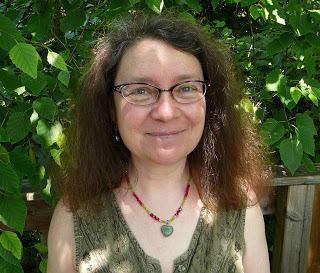 Her third book, Web of Angels, is a contemporary novel that took eight years and 10 drafts to complete.
Her third book, Web of Angels, is a contemporary novel that took eight years and 10 drafts to complete.
Nattel will launch Web of Angels, already a Canadian bestseller, at McNally Robinson on Wednesday.
1) As a writer (i.e. someone whose artistic practice is predicated on time spent alone) how do you approach performance? What do you get out of it?
A book is a partnership between author and readers. I put the words on the page, but every reader takes those words and turns them into something new. Much of the time we do this at a distance, so I love the opportunity to meet face to face and connect at a talk or reading. It's exciting; you can feel the positive energy it creates. And then there are also those quiet, more intimate moments when readers speak to me while I sign books. I cherish those memories even years later. Of course it's tiring. Nobody can sit alone writing in a room for years on end without a need for, and enjoyment of, solitude. But I wouldn't trade it away if I could.
2) What do you want people to know about Web of Angels?
Like a lot of people, my idea of multiple personalities was shaped by Sybil. But when I actually met and got to know real men and women who are multiple, they weren't like that at all. They worked, had families and friends, and made it their business to blend and assimilate with "singletons" so their differences wouldn't be noticed. But behind the scenes was another story. The beauty of fiction is that reading it is a lived experience through which readers can find out what it's like to be someone else. By writing a novel, I could take readers into the secret lives of multiples. To do that and do it well, authentically, in a story that turns pages without let-up, and with fine writing, took me eight years.
3) Will this be your first time in Winnipeg? What have you heard?
I first visited Winnipeg in the mid-1990s. It was a balmy spring by Winnipeg standards, which meant that I was shivering while locals went outside in short-sleeved shirts. I loved walking through Winnipeg streets on my own, and explored The Forks. Standing for a while at the meeting place of two great rivers, I thought about what it was like in an earlier time. I bought a small piece of art, all I could afford then. It still hangs on the wall in my living room.
My oldest friend - we've known each other since I was five years old - is a musician who lived in Winnipeg for a number of years. So when I think of Winnipeg, I picture a vibrant and robust arts community: book lovers, music lovers and art lovers. Now in middle age I'm warmer and hardier than I once was and I can walk around in my shirt sleeves with the best of them!
4) What are you reading right now? What are you writing right now?
I've got two writing projects in mind: another contemporary novel and a historical novel. From past experience, I know that I can't consider a book viable until there's a complete first draft. It could morph into something entirely different or it might stall because there is something I haven't anticipated that is coming down the pipe and demanding to be written. In the meantime, I've got a huge pile of books on my desk, some for research, some to review, others for pure pleasure. I'm about to start reading The Little Shadows by Marina Endicott and I'm so looking forward to that and sharing a podium with her while we're on tour.
5) What led you to write about dissociative identity disorder (DID)?
When my children were young, I participated in a chat room for people healing from difficult life experiences. There I encountered many people, in fact more than two dozen, who'd survived early trauma by developing multiple personalities, i.e. DID. In the process, I discovered that someone close to me was multiple, which I hadn't at all suspected because I had pictured DID as Sybil. It drove me crazy that the media images were so far from the reality, and that the quiet heroism of the people I knew was never recognized or acknowledged.
Ariel Gordon is a Winnipeg writer.
Winnipeg Free Press - PRINT EDITION
by: Ariel Gordon
Toronto writer Lilian Nattel wrote The River Midnight, a historical novel that became a international bestseller, while working full-time as a chartered accountant. She wrote her second historical novel, 2004's The Singing Fire, while parenting two toddlers.
 Her third book, Web of Angels, is a contemporary novel that took eight years and 10 drafts to complete.
Her third book, Web of Angels, is a contemporary novel that took eight years and 10 drafts to complete.Nattel will launch Web of Angels, already a Canadian bestseller, at McNally Robinson on Wednesday.
1) As a writer (i.e. someone whose artistic practice is predicated on time spent alone) how do you approach performance? What do you get out of it?
A book is a partnership between author and readers. I put the words on the page, but every reader takes those words and turns them into something new. Much of the time we do this at a distance, so I love the opportunity to meet face to face and connect at a talk or reading. It's exciting; you can feel the positive energy it creates. And then there are also those quiet, more intimate moments when readers speak to me while I sign books. I cherish those memories even years later. Of course it's tiring. Nobody can sit alone writing in a room for years on end without a need for, and enjoyment of, solitude. But I wouldn't trade it away if I could.
2) What do you want people to know about Web of Angels?
Like a lot of people, my idea of multiple personalities was shaped by Sybil. But when I actually met and got to know real men and women who are multiple, they weren't like that at all. They worked, had families and friends, and made it their business to blend and assimilate with "singletons" so their differences wouldn't be noticed. But behind the scenes was another story. The beauty of fiction is that reading it is a lived experience through which readers can find out what it's like to be someone else. By writing a novel, I could take readers into the secret lives of multiples. To do that and do it well, authentically, in a story that turns pages without let-up, and with fine writing, took me eight years.
3) Will this be your first time in Winnipeg? What have you heard?
I first visited Winnipeg in the mid-1990s. It was a balmy spring by Winnipeg standards, which meant that I was shivering while locals went outside in short-sleeved shirts. I loved walking through Winnipeg streets on my own, and explored The Forks. Standing for a while at the meeting place of two great rivers, I thought about what it was like in an earlier time. I bought a small piece of art, all I could afford then. It still hangs on the wall in my living room.
My oldest friend - we've known each other since I was five years old - is a musician who lived in Winnipeg for a number of years. So when I think of Winnipeg, I picture a vibrant and robust arts community: book lovers, music lovers and art lovers. Now in middle age I'm warmer and hardier than I once was and I can walk around in my shirt sleeves with the best of them!
4) What are you reading right now? What are you writing right now?
I've got two writing projects in mind: another contemporary novel and a historical novel. From past experience, I know that I can't consider a book viable until there's a complete first draft. It could morph into something entirely different or it might stall because there is something I haven't anticipated that is coming down the pipe and demanding to be written. In the meantime, I've got a huge pile of books on my desk, some for research, some to review, others for pure pleasure. I'm about to start reading The Little Shadows by Marina Endicott and I'm so looking forward to that and sharing a podium with her while we're on tour.
5) What led you to write about dissociative identity disorder (DID)?
When my children were young, I participated in a chat room for people healing from difficult life experiences. There I encountered many people, in fact more than two dozen, who'd survived early trauma by developing multiple personalities, i.e. DID. In the process, I discovered that someone close to me was multiple, which I hadn't at all suspected because I had pictured DID as Sybil. It drove me crazy that the media images were so far from the reality, and that the quiet heroism of the people I knew was never recognized or acknowledged.
Ariel Gordon is a Winnipeg writer.
Published on April 01, 2012 11:43
March 26, 2012
Zion National Park, part the second

All photos Zion National Park, Utah, USA. March 26, 2012.
* * *
We took the girl to Zion for our last hike of the trip. The trails we chose were congested and even paved (which to me is NEVER a sign of a good hike), but it was fun to stand and be misted by Zion's waterfalls.
And we saw many small plants in bloom, which was something we hadn't ever witnessed in Utah. (Our previous trips had all been in January and February...)
Here's to Utah greenery, eh?
Published on March 26, 2012 10:40
March 25, 2012
Maclear's risk-taking creates important novel
Winnipeg Free Press - PRINT EDITION
Reviewed by: Ariel Gordon
Stray Love
By Kyo Maclear
HarperCollins, 320 pages, $30
TORONTO writer Kyo Maclear's lovely second novel is set in present-day London and Vietnam War-era Saigon and tells the story an adopted son of a British foreign correspondent.
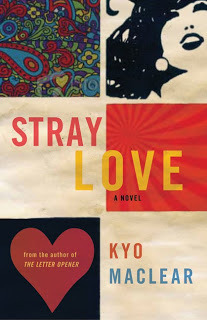 Marcel Laurence, despite his European name, grows up non-white in 1950s England, with no idea who - or where - his birth parents are. The one constant in his life is his adoptive father Oliver, who himself was orphaned by the London blitz.
Marcel Laurence, despite his European name, grows up non-white in 1950s England, with no idea who - or where - his birth parents are. The one constant in his life is his adoptive father Oliver, who himself was orphaned by the London blitz.
Given all of that, it will surprise no one to hear that Maclear - the British-Japanese daughter of foreign correspondent and documentary filmmaker Michael Maclear - has focused Stray Love on issues of identity, loss and healing. Traditional Canlit tropes, right?
But it is Maclear's risk-taking, her willingness to write characters so close to her own experience and to put them through so very much that makes Stray Love an important novel. It also firmly establishes Maclear in the echelon of home-and-abroad writers such as Madeleine Thien and Karen Connelly.
Interestingly, while Maclear takes great pains to get Marcel - and her readers - to 1960s Vietnam, the majority of her novel's conflicts are domestic.
Oliver, though distracted by his work and its attendant demons, works hard to keep the details of the war - the zippo missions and hot zones he reports on - from his son.
He also works hard to keep the identity of Marcel's birth parents a secret. All Marcel knows is that his mother was briefly institutionalized and that Oliver loved her. Which isn't much help to Marcel, whose mixed-race appearance draws stares from adults and taunts from schoolmates in England.
Once in Vietnam, however, 11-year-old Marcel is left his own devices, which include drawing in his notebook and wandering the streets around Hotel Continental, the home base for Saigon's foreign correspondents.
Though everything around him is strange, Marcel is startled by how at home he feels in Vietnam:
"In Saigon, I walked lightly. I bore fewer questions, suffered less scrutiny and, consequently, felt more at ease. Everywhere I looked, I saw faces that resembled mine, Eurasian faces, Hmong faces, in-between faces."
Maclear's previous novel, The Letter Opener (1997) and the children's book Spork (2010), were similarly focused on identity.
Unlike Stray Love, which relies on the documentary evidence of Marcel's drawings and Oliver's newspaper clippings, Maclear's earlier work puts a lot of weight, metaphorically, on objects.
Maclear's debut is told from the point of view of Naiko, a Japanese-British woman who works in Toronto's Undeliverable Mail Office. The commitment-shy Naiko knows it's all "just stuff" but finds it reassuring that objects can act as placekeepers for memories, how they are, literally, souvenirs.
Spork, written before the birth of Maclear's first child, is the story of a piece of cutlery that "is neither spoon nor fork…but a bit of both."
Structurally, Stray Love alternates between Marcel's insecure childhood and his middle age, where he is still uncertain about who he is, even if he now knows who his parents are.
Marcel is driven into memories of his childhood when his oldest friend, the Japanese-English Kiyomi, asks if he can look after her daughter Iris for a few weeks.
Iris drags out a suitcase of Marcel's mother's things, which Marcel must now deal with, literally and figuratively, before Kiyomi comes to pick up Iris.
Maclear can be forgiven for making Marcel's "baggage" manifest, after all the darkness that has preceded it. It's all "just stuff," right?
Ariel Gordon is a Winnipeg writer.
Reviewed by: Ariel Gordon
Stray Love
By Kyo Maclear
HarperCollins, 320 pages, $30
TORONTO writer Kyo Maclear's lovely second novel is set in present-day London and Vietnam War-era Saigon and tells the story an adopted son of a British foreign correspondent.
 Marcel Laurence, despite his European name, grows up non-white in 1950s England, with no idea who - or where - his birth parents are. The one constant in his life is his adoptive father Oliver, who himself was orphaned by the London blitz.
Marcel Laurence, despite his European name, grows up non-white in 1950s England, with no idea who - or where - his birth parents are. The one constant in his life is his adoptive father Oliver, who himself was orphaned by the London blitz.Given all of that, it will surprise no one to hear that Maclear - the British-Japanese daughter of foreign correspondent and documentary filmmaker Michael Maclear - has focused Stray Love on issues of identity, loss and healing. Traditional Canlit tropes, right?
But it is Maclear's risk-taking, her willingness to write characters so close to her own experience and to put them through so very much that makes Stray Love an important novel. It also firmly establishes Maclear in the echelon of home-and-abroad writers such as Madeleine Thien and Karen Connelly.
Interestingly, while Maclear takes great pains to get Marcel - and her readers - to 1960s Vietnam, the majority of her novel's conflicts are domestic.
Oliver, though distracted by his work and its attendant demons, works hard to keep the details of the war - the zippo missions and hot zones he reports on - from his son.
He also works hard to keep the identity of Marcel's birth parents a secret. All Marcel knows is that his mother was briefly institutionalized and that Oliver loved her. Which isn't much help to Marcel, whose mixed-race appearance draws stares from adults and taunts from schoolmates in England.
Once in Vietnam, however, 11-year-old Marcel is left his own devices, which include drawing in his notebook and wandering the streets around Hotel Continental, the home base for Saigon's foreign correspondents.
Though everything around him is strange, Marcel is startled by how at home he feels in Vietnam:
"In Saigon, I walked lightly. I bore fewer questions, suffered less scrutiny and, consequently, felt more at ease. Everywhere I looked, I saw faces that resembled mine, Eurasian faces, Hmong faces, in-between faces."
Maclear's previous novel, The Letter Opener (1997) and the children's book Spork (2010), were similarly focused on identity.
Unlike Stray Love, which relies on the documentary evidence of Marcel's drawings and Oliver's newspaper clippings, Maclear's earlier work puts a lot of weight, metaphorically, on objects.
Maclear's debut is told from the point of view of Naiko, a Japanese-British woman who works in Toronto's Undeliverable Mail Office. The commitment-shy Naiko knows it's all "just stuff" but finds it reassuring that objects can act as placekeepers for memories, how they are, literally, souvenirs.
Spork, written before the birth of Maclear's first child, is the story of a piece of cutlery that "is neither spoon nor fork…but a bit of both."
Structurally, Stray Love alternates between Marcel's insecure childhood and his middle age, where he is still uncertain about who he is, even if he now knows who his parents are.
Marcel is driven into memories of his childhood when his oldest friend, the Japanese-English Kiyomi, asks if he can look after her daughter Iris for a few weeks.
Iris drags out a suitcase of Marcel's mother's things, which Marcel must now deal with, literally and figuratively, before Kiyomi comes to pick up Iris.
Maclear can be forgiven for making Marcel's "baggage" manifest, after all the darkness that has preceded it. It's all "just stuff," right?
Ariel Gordon is a Winnipeg writer.
Published on March 25, 2012 09:30
March 23, 2012
Zion National Park
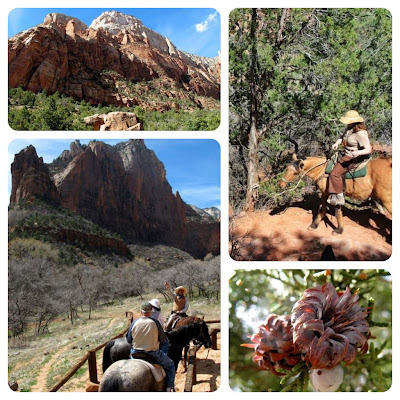
All photos Zion National Park, Utah, USA. March 23, 2012.
* * *
I got a three hour horseback ride through Zion National Park as an early birthday present. Whee!
Seriously: whee!
Published on March 23, 2012 09:23
March 22, 2012
Bryce Canyon National Park

All photos Bryce Canyon National Park, Utah, USA. March 22, 2012.
* * *
This was our fourth trip to Utah but only our first attempt on Bryce Canyon National Park, which was two plus hours away from St. George. It was a long day, both logistically and in terms of the hike itself: lost sunglasses and a walk of nearly 4 miles.
But...all that goddamn rock! It almost didn't matter that the trail was muddy or that the last bit of our hike was nearly vertical...
We ended our day at Thai/Asian fusion restaurant in Springdale, the town just outside the park. And then we drove home under all those stars, the girl snoring softly from the back seat.
Published on March 22, 2012 08:47
March 21, 2012
Snow Canyon: Gila Trail

All photos St. George, Utah, USA. March 21, 2012.
* * *
The Gila Trail is a new trail, built on the edge of Snow Canyon State Park. Which means that it was ALL overlook, which was very nice. Also fun was crossing paths with a rider on horseback...
Published on March 21, 2012 09:43
March 20, 2012
Anasazi Valley Trail
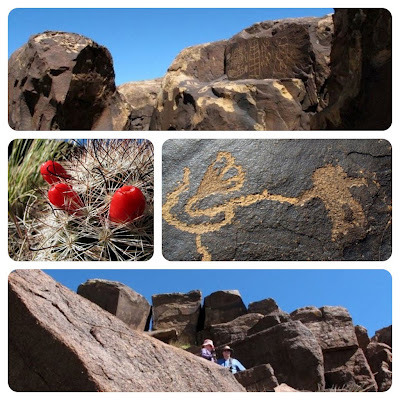
All photos Santa Clara River Reserve, Utah, USA. March 20, 2012.
* * *
The Anasazi Valley Trail was another new-to-us trail, having been tipped to its presence by the ranger on our Johnson Canyon hike. The trailhead was poorly marked, which is often the case with local trails, but once we figured out where it was, we had a glorious hike mountain goating from rock to rock.
And the petroglyphs were, well, amazing, especially the larger groupings. Though a subsequent internet search revealed some information on which symbols were common to the different Indigenous groups that occupied the area, it was very interesting to see the petroglyphs and not know which elements were from what era. You had to take them as a whole...
Published on March 20, 2012 12:23
March 18, 2012
Out-of-Town-Authors: Irshad Manji
Finding Mecca on my bookshelves
Winnipeg Free Press - PRINT EDITION
by: Ariel Gordon
The Manhattan-based but Vancouver-raised journalist Irshad Manji heads up the Moral Courage Project at New York University.
 She has published two books, including 2003's The Trouble with Islam Today (Random House) and produced an Emmy-nominated documentary, Faith Without Fear.
She has published two books, including 2003's The Trouble with Islam Today (Random House) and produced an Emmy-nominated documentary, Faith Without Fear.
Manji will be in Winnipeg on Wednesday at McNally Robinson, launching the paperback edition of Allah, Liberty & Love: The Courage to Reconcile Faith and Freedom.
1) As a writer, how do you approach performance? What do you get out of it?
As a person of faith — and not just as a writer — I believe that humans pay tribute to God's creative powers when we use our own. Writing is a tribute to the creativity with which the Source has endowed all of us. In Allah, Liberty & Love, I explain that I've recently unfurled my childhood prayer rug and oriented it towards the bookshelves that line my apartment. That's my Mecca, because the bookcases reveal the majesty of a Creator that has gifted each of us with the power of expression. Not everyone wishes to write, of course, but everyone has the capacity to express creativity even in the seemingly mundane task of how we frame reality. For each of us, every day is a performance of sorts. But is that performance motivated by pure ego — or by higher virtues, such as gratitude? I try to live the latter choice.
2) What do you want people to know about Allah, Liberty & Love?
I want readers to know that Allah, Liberty & Love is about — and for — all of us, not only Muslims or people who are already curious about culture, religion and global politics. Actually, the book is a series of lessons about how to live honestly. I've written it through the unique yet universal lens of individuals who show us what it is to be alive even in the midst of death threats. The first lesson is: Some things are more important than fear. The final lesson is: Lack of meaning is the real death threat. In-between are lessons that will equip individuals of various creeds to live "faithfully free."
3) Will this be your first time in Winnipeg? What have you heard?
I've long cooed to friends that Winnipeg seems to produce a disproportionate number of creative types. For a small city, you folks make a big artistic splash. And no, this won't be my first time in Winnipeg. Lord willing, it also won't be my last.
3) What are you reading right now? What are you writing right now?
I'm in Morocco, and I'm reading a tweet that refers to me as an "illiterate whore." But every morning when I'm not traveling, I pluck a random book off my shelves, open it somewhere in the middle, and read a couple pages. Then I read the first few pages to put the ideas into context. This wakes up my mind so I can think more deeply about the rest of my day. It's also a reminder about the virtues of being still, given the craziness that lies ahead of me. So what did I read this morning? I won't tell. It's the discipline of reading and reflecting that matters. As for what I'm writing — a friendly response to the "illiterate whore" tweet.
4) What is moral courage?
Simply put, moral courage is the willingness to speak up when everyone wants to shut you up. It's about daring to develop your individuality and, in that way, resisting conformity. I believe moral courage is crucial to diversity. Too often, we conflate diversity with labels — "woman," "queer," "Muslim," whatever. The pressure to identify with your "own" reduces pluralism to groupthink. That's dishonest diversity. True diversity comes when you exercise your unique voice. That's when you're contributing to diversity of thought, not just of appearance. Sure, you'll get backlash from your community for being different, but the beauty is, your community grows from talent that would otherwise be lost to self-censorship. The delicious paradox of moral courage is this: Individuality expands community.
Ariel Gordon is a Winnipeg writer.
Winnipeg Free Press - PRINT EDITION
by: Ariel Gordon
The Manhattan-based but Vancouver-raised journalist Irshad Manji heads up the Moral Courage Project at New York University.
 She has published two books, including 2003's The Trouble with Islam Today (Random House) and produced an Emmy-nominated documentary, Faith Without Fear.
She has published two books, including 2003's The Trouble with Islam Today (Random House) and produced an Emmy-nominated documentary, Faith Without Fear.Manji will be in Winnipeg on Wednesday at McNally Robinson, launching the paperback edition of Allah, Liberty & Love: The Courage to Reconcile Faith and Freedom.
1) As a writer, how do you approach performance? What do you get out of it?
As a person of faith — and not just as a writer — I believe that humans pay tribute to God's creative powers when we use our own. Writing is a tribute to the creativity with which the Source has endowed all of us. In Allah, Liberty & Love, I explain that I've recently unfurled my childhood prayer rug and oriented it towards the bookshelves that line my apartment. That's my Mecca, because the bookcases reveal the majesty of a Creator that has gifted each of us with the power of expression. Not everyone wishes to write, of course, but everyone has the capacity to express creativity even in the seemingly mundane task of how we frame reality. For each of us, every day is a performance of sorts. But is that performance motivated by pure ego — or by higher virtues, such as gratitude? I try to live the latter choice.
2) What do you want people to know about Allah, Liberty & Love?
I want readers to know that Allah, Liberty & Love is about — and for — all of us, not only Muslims or people who are already curious about culture, religion and global politics. Actually, the book is a series of lessons about how to live honestly. I've written it through the unique yet universal lens of individuals who show us what it is to be alive even in the midst of death threats. The first lesson is: Some things are more important than fear. The final lesson is: Lack of meaning is the real death threat. In-between are lessons that will equip individuals of various creeds to live "faithfully free."
3) Will this be your first time in Winnipeg? What have you heard?
I've long cooed to friends that Winnipeg seems to produce a disproportionate number of creative types. For a small city, you folks make a big artistic splash. And no, this won't be my first time in Winnipeg. Lord willing, it also won't be my last.
3) What are you reading right now? What are you writing right now?
I'm in Morocco, and I'm reading a tweet that refers to me as an "illiterate whore." But every morning when I'm not traveling, I pluck a random book off my shelves, open it somewhere in the middle, and read a couple pages. Then I read the first few pages to put the ideas into context. This wakes up my mind so I can think more deeply about the rest of my day. It's also a reminder about the virtues of being still, given the craziness that lies ahead of me. So what did I read this morning? I won't tell. It's the discipline of reading and reflecting that matters. As for what I'm writing — a friendly response to the "illiterate whore" tweet.
4) What is moral courage?
Simply put, moral courage is the willingness to speak up when everyone wants to shut you up. It's about daring to develop your individuality and, in that way, resisting conformity. I believe moral courage is crucial to diversity. Too often, we conflate diversity with labels — "woman," "queer," "Muslim," whatever. The pressure to identify with your "own" reduces pluralism to groupthink. That's dishonest diversity. True diversity comes when you exercise your unique voice. That's when you're contributing to diversity of thought, not just of appearance. Sure, you'll get backlash from your community for being different, but the beauty is, your community grows from talent that would otherwise be lost to self-censorship. The delicious paradox of moral courage is this: Individuality expands community.
Ariel Gordon is a Winnipeg writer.
Published on March 18, 2012 13:45
Honeycomb Rocks
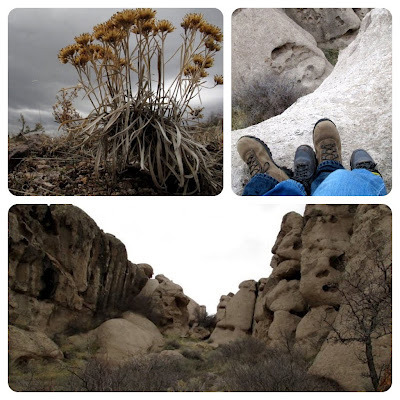
All photos Dixie National Forest/Enterprise, Utah, USA. March 17, 2012.
* * *
M's parents drove us to the Honeycomb Rocks Campground, which is situated in Dixie National Forest.
The campsite is situated in a huge, heavily eroded sandstone chunk. A few sites had their picnic tables situated inside caves (!) and even though it was quite cool, we had a lot of fun climbing into the various holes and crevasses. Nearby there was the man-made Enterprise Reservoir, which has changed the dry desert-y landscape, but eating fish was out: the water is sadly contaminated with mercury.
Published on March 18, 2012 09:13



